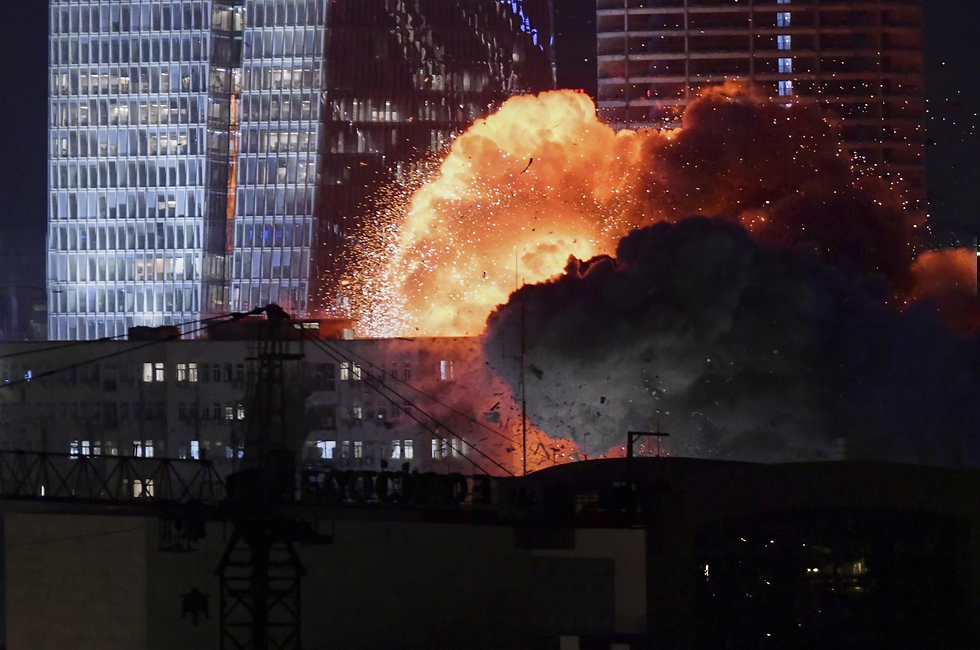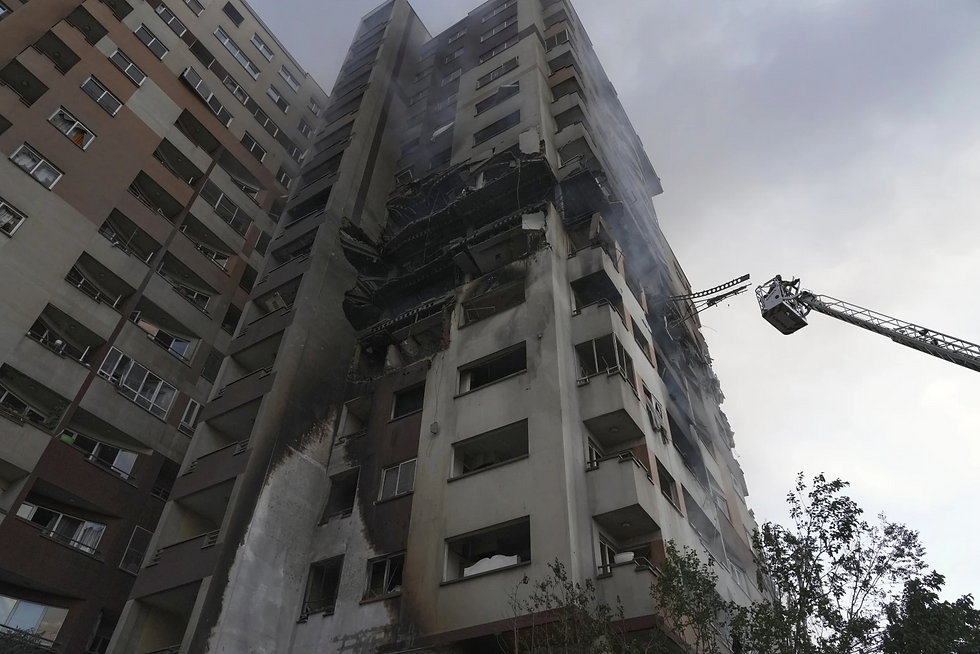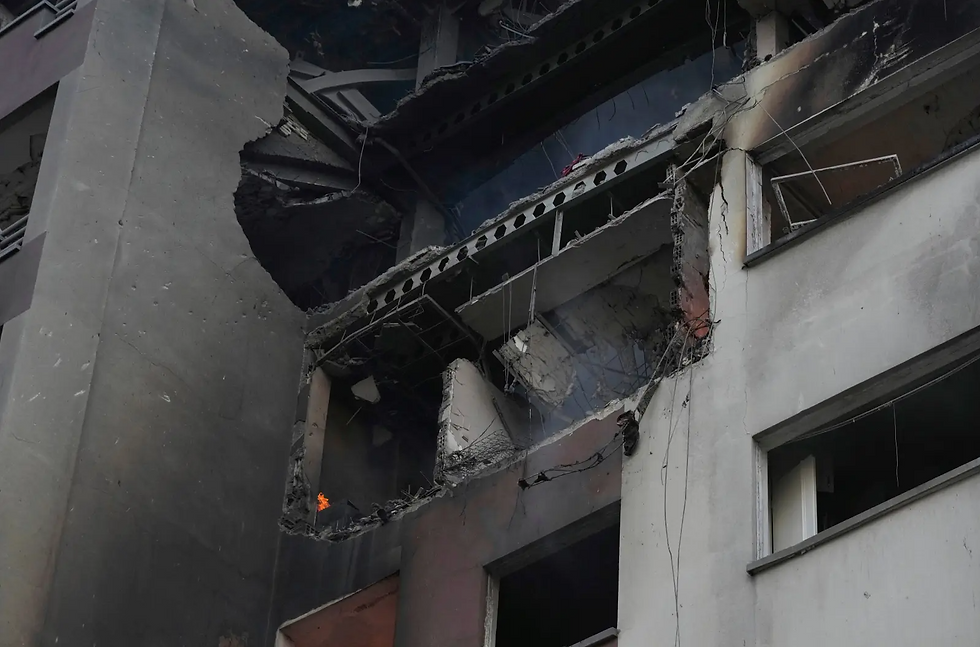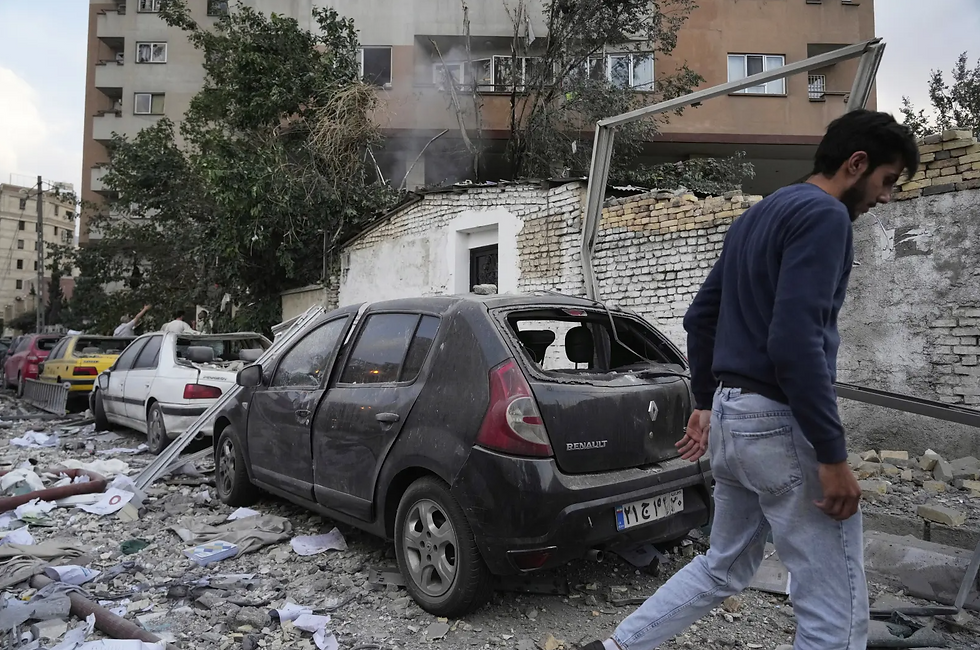Top Generals killed as Israel Hits Iran Nuclear Sites, Iran Responds with Missiles
- News Blend 360

- Jun 12, 2025
- 7 min read

By NEWS BLEND 360
Updated 11:24 PM EDT, June 13, 2025
DUBAI, United Arab Emirates (NB360) — On Friday, Israel initiated intense attacks on Iran’s core nuclear and military infrastructure, utilizing warplanes and drones previously smuggled into the country to target critical facilities and eliminate top generals and scientists. Israel stated this offensive was essential to prevent its adversary from advancing further toward developing a nuclear weapon.
In response, Iran launched numerous ballistic missiles at Israel late Friday, with explosions lighting up the skies over Jerusalem and Tel Aviv and causing buildings to tremble.
During a second wave of attacks, sirens and explosions, possibly from Israeli interceptors, echoed over Jerusalem early Saturday. The Israeli military advised civilians, already shaken by the previous missile barrage, to seek shelter.
Later, an Iranian missile landed near residences in the central Israeli city of Rishon Lezion, injuring 13 individuals, according to Israel’s paramedic service, Magen David Adom.
One person was critically injured, while another was in serious condition, as reported by the paramedic service. Eli Bin, the director of Magen David Adom, informed Israel’s Channel 12 that several people remained trapped.
New wave of Iranian missiles launched
The Iranian news agency Nour News, which has close ties to the paramilitary Revolutionary Guard, announced early Saturday that a new wave was underway. Associated Press reporters in Tel Aviv witnessed at least two Iranian missiles hitting the ground, although there was no immediate information on casualties.

Iran fires back at Israel
Tel-Aviv and Jerusalem both targeted in retaliation strikes Friday.


Where Israel struck Iran's capital

A hospital in Tel Aviv provided treatment to seven individuals injured in the second Iranian attack; all except one sustained minor injuries. According to Israel’s Fire and Rescue Services, the injuries occurred when a projectile struck a building in the city.

Meanwhile, shortly after midnight on Saturday, the sound of explosions and Iranian air defense systems targeting objects reverberated throughout central Tehran, and an Associated Press reporter could hear air raid sirens near their residence.
Iran’s semi-official Tasnim news agency reported a fire at Tehran’s Mehrabad International Airport, accompanied by a video posted on X showing a column of smoke and orange flames rising from what the outlet identified as the airport.
In a recorded message on Friday, Iran’s Supreme Leader Ayatollah Ali Khamenei stated: “We will not allow them to escape safely from this great crime they committed.” Iran’s U.N. ambassador reported 78 deaths and over 320 injuries due to Israeli attacks.
Israel’s paramedic services reported 34 injuries from the barrage on the Tel Aviv area, including a woman critically injured after being trapped under debris. In Ramat Gan, east of Tel Aviv, an Associated Press journalist observed burned-out cars and at least three damaged houses, one with its front nearly completely torn away.
U.S. ground-based air defense systems in the region were assisting in intercepting Iranian missiles, according to a U.S. official who spoke anonymously to discuss the measures.
Israel’s ongoing airstrikes and intelligence operations, along with Iran’s retaliation, heightened fears of a full-scale war between the countries and further destabilized an already tense region.
Israel had long threatened such a strike, and successive American administrations tried to prevent it, fearing it could spark a broader conflict across the Middle East and might not effectively destroy Iran’s dispersed and fortified nuclear program.
However, a series of events triggered by Hamas’ attack on October 7, 2023, along with the reelection of U.S. President Donald Trump, set the conditions for Israel to finally act on its threats. Israeli Prime Minister Benjamin Netanyahu stated that the U.S. was informed of the attack in advance.
On Thursday, Iran was censured by the U.N.’s atomic watchdog for failing to comply with obligations designed to prevent it from developing a nuclear weapon.

Regional Nations Denounce Israel's Assault
Countries in the region criticized Israel's assault, while global leaders urged both sides to deescalate immediately.
The U.N. Security Council convened an emergency session on Friday afternoon at Iran's behest. In a letter to the council, Iran's Foreign Minister Abbas Araghchi described the killing of its officials and scientists as "state terrorism" and emphasized his nation's right to self-defense.
According to Israel's military, around 200 aircraft participated in the initial strike on approximately 100 targets. The Mossad intelligence agency had pre-positioned explosive drones and precision weapons inside Iran, using them to target Iranian air defenses and missile launchers near Tehran, as reported by two security officials who requested anonymity.
The officials' claims could not be independently verified.
Key sites targeted by Israel included Iran's primary nuclear enrichment facility in Natanz, where black smoke was visible. It also seemingly targeted a secondary, smaller nuclear enrichment site in Fordo, about 100 kilometers (60 miles) southeast of Tehran, according to an Iranian news outlet close to the government that reported hearing explosions nearby.
Israel claimed it also hit a nuclear research facility in Isfahan and reported destroying numerous radar installations and surface-to-air missile launchers in western Iran. Iran confirmed the strike on Isfahan.
Israel military spokesman Brig. Gen. Effie Defrin stated that the Natanz facility was "significantly damaged" and that the operation was "still in the beginning stages."
Destruction of Natanz Facility's Above-Ground Section
U.N. nuclear chief Rafael Grossi informed the Security Council that the above-ground section of the Natanz facility was destroyed. He reported that all electrical infrastructure and emergency power generators were destroyed, along with a section of the facility where uranium was enriched up to 60%.
The primary underground centrifuge facility appeared to remain unharmed, though the power loss might have damaged its infrastructure, he noted.
The initial wave of strikes granted Israel "significant freedom of movement" in Iranian airspace, paving the way for further assaults, according to an unnamed Israeli military official not authorized to discuss the attack details with the media.
The official mentioned that Israel is ready for an operation potentially lasting up to two weeks, though no definitive timeline exists.
Among those killed were three of Iran's top military leaders: Gen. Mohammad Bagheri, overseeing the entire armed forces; Gen. Hossein Salami, who led the paramilitary Revolutionary Guard; and Gen. Amir Ali Hajizadeh, head of the Guard's ballistic missile program.
Iran confirmed the deaths of all three, significant losses to its ruling theocracy that will complicate retaliation efforts. Khamenei stated that other top military officials and scientists were also killed.
Netanyahu revealed that the attack had been planned for months. In a video statement released to journalists on Friday, he mentioned ordering the attack plans last November, shortly after the killing of Hassan Nasrallah, the Hezbollah leader in Lebanon, one of Iran's strongest allies. The attack was originally scheduled for April but was postponed.
In its initial response on Friday, Iran launched over 100 drones at Israel. Israel reported intercepting the drones outside its airspace, and it was unclear if any penetrated.
Israel's military announced the mobilization of reservists and deployment of troops nationwide as it prepared for further Iranian or proxy group retaliation.
Trump urged Iran on Friday to negotiate a deal with the U.S. regarding its nuclear program, warning on his Truth Social platform that Israel's attacks "will only escalate."
"Iran must reach an agreement before there's nothing left, preserving what was once the Iranian Empire," he wrote.
On Wednesday, the U.S. withdrew some American diplomats from Iraq's capital and offered voluntary evacuations for the families of U.S. troops in the broader Middle East. On Friday, the U.S. began reallocating military resources in the region, including ships, as Israel braced for further retaliation, according to two U.S. officials who spoke anonymously.
Officials in Washington had advised Israel against an attack earlier in the week to avoid disrupting U.S. negotiations with Iran over its nuclear enrichment program. They emphasized on Friday that the U.S. was not involved in the attack and cautioned against any retaliation targeting U.S. interests or personnel.

Israel Describes Strikes as Preventive Measures Against Iran’s Nuclear Program
Israeli officials argue that the attack was essential to prevent an imminent threat of Iran developing nuclear weapons, although it remains uncertain how close Iran is to achieving this capability or if it had any plans to launch an attack. Iran insists that its nuclear program is solely for civilian purposes.
“This poses a clear and immediate threat to Israel’s very existence,” Netanyahu stated, pledging to continue the attack as long as needed to “eliminate this threat.”
Israel is generally believed to be the only nation in the Middle East with nuclear weapons, although it has never confirmed possessing them.

In the past year, Israel has focused on Iran’s air defenses, striking a radar system of a Russian-made air defense battery in April 2024 and targeting surface-to-air missile sites and missile production facilities in October.
Iran Accuses Israel of Targeting Residential Areas
For Netanyahu, the operation acts as a diversion from Israel’s ongoing and increasingly destructive conflict in Gaza, which has now lasted over 20 months.
There is a broad consensus among Israelis that Iran is a major threat. However, if Iranian responses result in significant Israeli casualties or major disruptions to daily life, public opinion could shift quickly.
The Iran-backed Lebanese militant group Hezbollah issued a statement expressing condolences and condemning the attack, but did not threaten to join Iran in any retaliation. Hezbollah’s recent conflict with Israel — which led to the loss of much of its senior leadership — ended with a U.S.-brokered ceasefire in November.
Khamenei, the Iranian supreme leader, claimed that Israel “unleashed its wicked and blood-stained hand to commit a crime in our beloved country, exposing its malicious nature more than ever by targeting residential centers.”
Netanyahu expressed hope that the attacks would lead to the downfall of Iran’s theocracy, conveying to the Iranian people that the conflict is not with them, but with the “brutal dictatorship that has oppressed you for 46 years.”

___




Comments